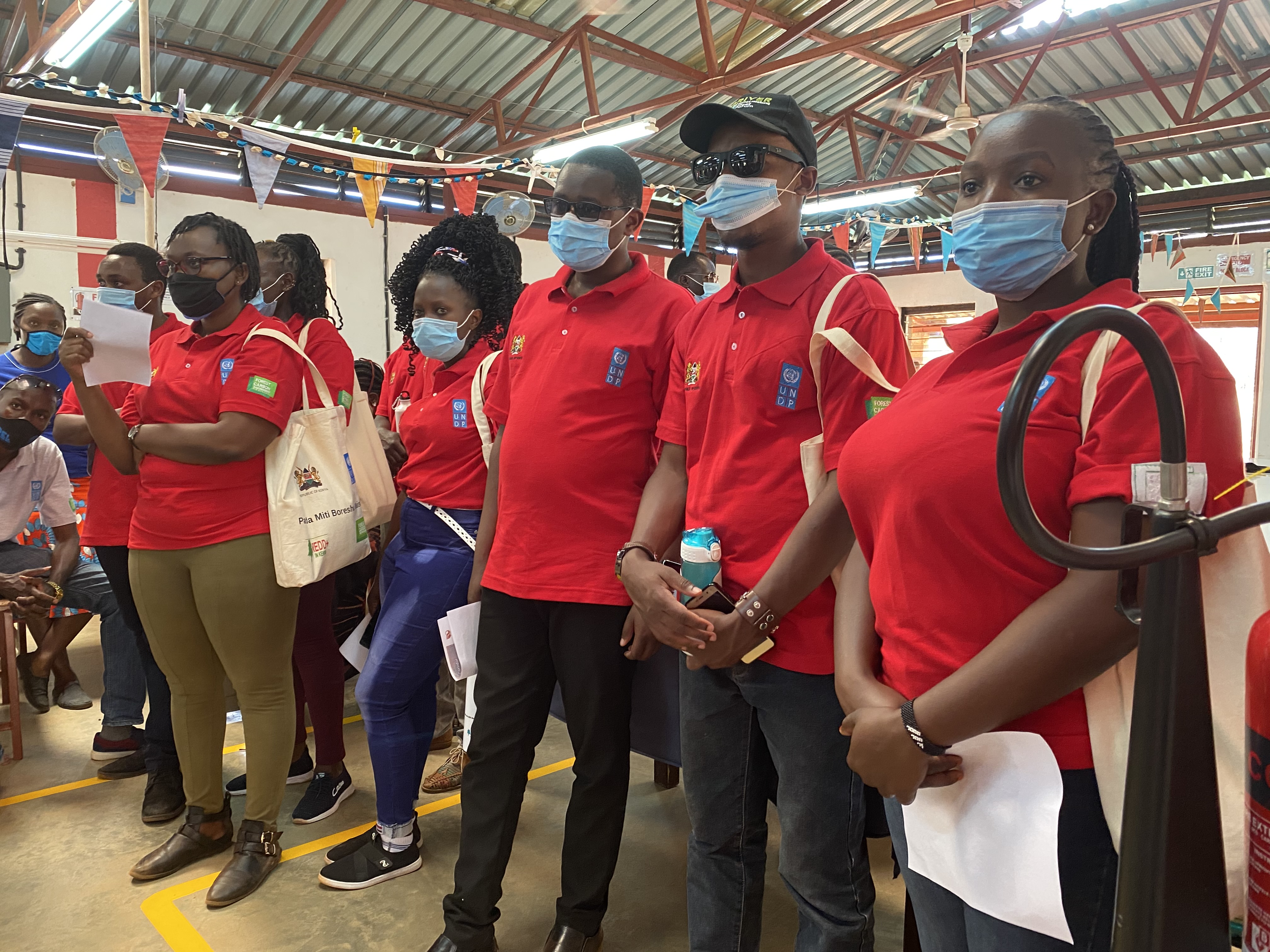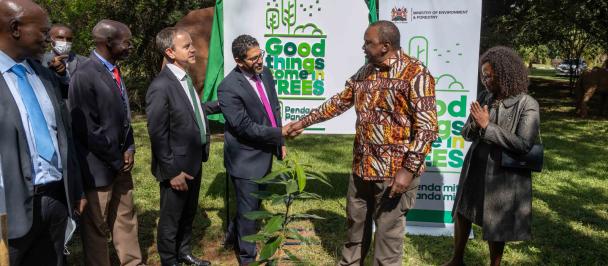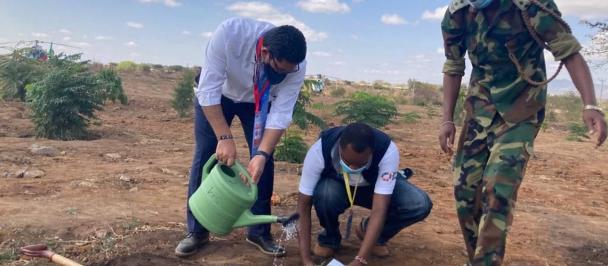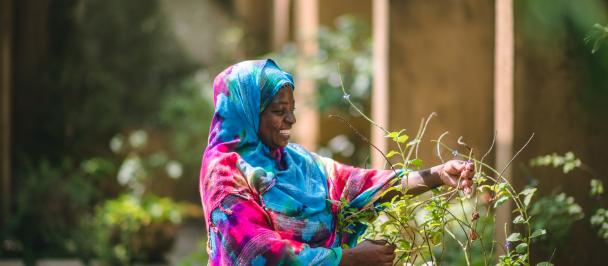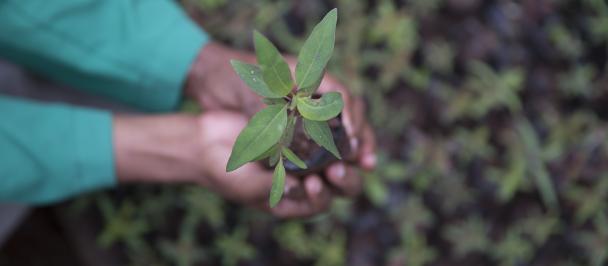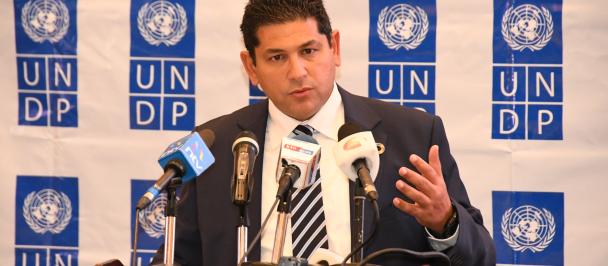UNDP convenes Youths to deliberate on REDD+ and Nature Based Enterpreneurship Skills
November 5, 2020
Environmental Youth Champions during an experiential learning field visit to the REDD+landmark project in Kasigau. The Kasigau Corridor REDD+ project was the first REDD+ project to be validated and verified under the Verified Carbon Standard (VCS) in Kenya. (Photo: Christabel Chanda-Ginsberg/UNDP Kenya)
In Kenya, youth population is estimated at over 60% and regarded as a key constituency in driving social and economic development. Youth empowerment remain a key pillar in meeting Kenya’s immediate, medium and long-term development aspirations. It is in this regard that the Forest Carbon Partnership Facility(FCPF) Reducing Emissions from Deforestation and forest Degradation (REDD+) programme is building their capacity, leveraging on their energies, creativity, networks and innovative skills in supporting the national 10% tree cover goal by 2022.
The active participation of women, young people as well as indigenous population and local communities in forest restoration/or reforestation efforts is also emphasized in UNFCCC Cancun Safeguards on REDD+ initiatives.
Youth engagement and capacity building is not only a REDD+ Safeguards requirement, but also an SDG requirement - engaging and empowering the youth and Agenda 2030 principle of leaving no one behind both stress the importance of including this critical constituency in designing and deploying development solutions. As such building youth capacities also strengthen their ability to participate effectively in implementation of the REDD+ Readiness activities today and future implementation of REDD+ interventions in the country.
In line with the above requirements, FCPF REDD+ team convened youth environmental champions in Voi, Taita Taveta with the aim of strengthening their level of awareness on the REDD+ readiness process in Kenya and to build their capacity on entrepreneurial skills within a green economy. Youths involved in entrepreneurial activities and green jobs were also invited to share their experiences and knowledge on how to make climate action as a business opportunity for youths.
Speaking at the meeting, Ms. Wanjuhi Njoroge the founder of People Planet Africa (an enterprise involved in Forest Protection & Restoration, Sustainability and Inclusive Development that incorporates rural communities) stated that “young people[like myself] are more exposed to the long term impacts of forest deforestation and degradation in Kenya and this is attributed mainly to impacts of climate change such as reduced water, prolonged drought, increased pests and diseases.” In order to remain resilient, she encouraged her fellow youths to explore alternative benefits of forests and contribute to raising awareness around the dangers of deforestation and biodiversity loss. She further encouraged them to engage in forestry businesses such as butterfly farming, bee keeping, tree nurseries, among others as sources of livelihood for themselves and their families.
During the meeting, youths were encouraged to seek more opportunities for effective participation in the national 10% forest cover agenda and environmental conservation efforts. To build entrepreneurship ecosystems, they were persuaded to apply for the Green Innovation awards through the National Environment Trust Fund (NETFUND) – a state corporation under the Ministry of Environment and Forestry. The goal of NETFUND as mentioned by Mr. Andrew Machora, is to stimulate and support development of innovation and green businesses for environmental management in Kenya. He emphasized that the Government of Kenya was committed to providing financial support to youth-led green business.
The role of youths in the country’s economic development agenda cannot be ignored as they contribute towards the economy through their innovativeness and strong desire for independence. Speaking at the meeting, Mr. Victor Awuor, Head of Solutions at UNDP’s Accelerator Lab said, “as youths we need to challenge the status quo and traditional ways of working in order to contribute to the country’s economic growth and curb the existing high rates of youth unemployment.”
In concurrence, UNDP Resident Representative Mr. Walid Badawi stated that UNDP Kenya is committed to involve youths in our efforts in finding creative and lasting solutions to some of the challenges faced in the forestry sector particularly deforestation and forest degradation. Mr. Badawi, called for youths to take action and take lead in the implementation and advocacy of nature-based solutions to curb climate change and environmental challenges in Kenya.
As part of their experimental learning experience, youths visited the REDD+ nesting in Kasigau. The Kasigau Corridor REDD+ project was awarded the Gold level status by the Community and Biodiversity Standard for exceptional biodiversity and climate benefits. The landmark project was the first REDD+ project to be validated and verified under the Verified Carbon Standard (VCS) in Kenya. This visit exposed youths to the REDD+ readiness process and the benefits they could acquire from forests and forest products in contributing to their livelihoods.
UNDP in partnership with the Ministry of Environment and Forestry is supporting Kenya’s efforts to pursue long-term, transformative development and accelerate sustainable climate resilient economic growth, while slowing the soaring rates of GHG emissions emanating from the forest sector.
This work is being carried out through the FCPF REDD+ Readiness project which aims to put in place mechanisms to enable Kenya to reach its overall REDD+ goal to improve livelihoods and wellbeing, conserve biodiversity, contribute to the national aspiration of attaining a minimum 10% forest cover and mitigate climate change for sustainable development. To achieve this, UNDP continues to build capacity of different stakeholders in REDD+ from the state and non-state actors, women and youths. Youths are an important segment of Kenya's population, they form a majority group, and hold a great potential for contributing to increasing the country's forest cover of 10% and more.

 Locations
Locations